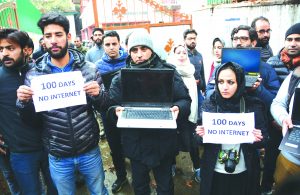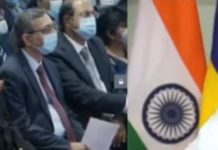 When four months ago the government imposed communication blockade in Kashmir in the wake of repeal of Article 370 which granted the state turned union territory a special status within Indian Union, nobody expected it to last so long. Though along the way the government has restored landlines and more recently post paid phones, the SMS, the prepaid phones and more importantly the internet remain suspended. And this has not only disconnected the Valley from the rest of the world but is also taking a huge toll on businesses and education.
When four months ago the government imposed communication blockade in Kashmir in the wake of repeal of Article 370 which granted the state turned union territory a special status within Indian Union, nobody expected it to last so long. Though along the way the government has restored landlines and more recently post paid phones, the SMS, the prepaid phones and more importantly the internet remain suspended. And this has not only disconnected the Valley from the rest of the world but is also taking a huge toll on businesses and education.
Responding to this situation, the state government has selectively released broadband service to some businessmen and a few IT companies, but this has changed nothing on the ground. The overall absence of the internet has disrupted life.
“In this time and age, you can’t have a normal life without internet,” says Abdullah Amin, a businessman. “Internet is part of the warp and woof of modern life. Be it businesses, healthcare, education, internet facilitates everything. And we are now without this facility for four months now”.
Businesses have been worst hit. In a recent statement, Kashmir Chamber of Commerce and Industries termed the internet “a basic need”. The trading group pegged the loss to economy due to continuing shutdown and communication blockade at around Rs 12000 crore.
“We have urged the government to restore internet to all the businesses,” says Vice president of KCCI Nasir Ahmad Khan. “Hopefully, the government may listen to our demand and take steps to release internet to all”.
But it seems unlikely that the government will restore internet anytime soon. In recent past, several rumours and even news reports to the effect have turned out to be a hoax. People are losing hope that the government has plans to make the service available in near future.
Journalists have been the worst victims of the internet gag. Srinagar’s Media Facilitation Centre has just nine computers with wifi connection for around three hundred journalists from local, national and international media outlets. Journalists get just enough time to check and send mail. They have to travel long distance to the Centre to do so.
Even the local newspapers don’t have internet access in their offices. They download most of their content at the Media Centre on pen drives and reproduce the same in their newspapers with some skeletal reports on the local situation. Government remains the dominant source of information for the local people. They get to hear it in local newspapers which more or less toe the government line or on satellite television which remains the only mass media freely available in the state. In the absence of internet, people have no access to most of the reports filed by the journalists active in the state.
In a statement, Kashmir Editors Guild has demanded the restoration of the internet saying it was now becoming “impossible” to carry on like this. Over the past several months, journalists at Kashmir Press Club have held silent protests but so far government has paid no attention.
The government’s main concern is that the restoration of internet may give a platform to the dissident groups to air their views. Government also fears that the internet may be used as an instrument to organize a public response to the revocation of Article 370.
The situation in the Valley, however, hasn’t erupted in a sweeping groundswell as was also expected. The people have largely exercised restraint. This should have normally given the government confidence to relax curbs. But this hasn’t happened. And there are no signs that this may happen in near future.
There is now a chorus building up for the government to at least start broadband services which has a smaller penetration. “As for as the internet is concerned, least that the government can do is to initially restore the broadband connections,” wrote an editorial in a local daily. “They are largely owned by the professionals, media and business establishments and are thus not prone to misuse as the government seems to apprehend.
letters@tehelka.com












